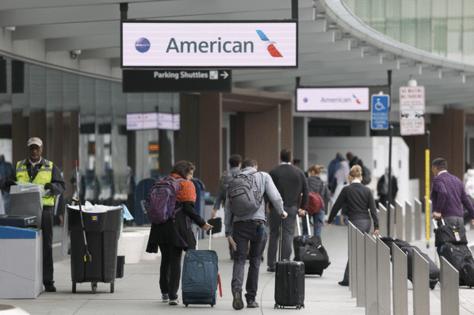Mihir Sharma: Why I'm thinking twice about traveling to the US
Published in Op Eds
In the months and years after 9/11, going to the U.S. was scary for many of us. Border security became harsh and unforgiving, and we could feel our rights drop away upon entering American airspace. Novels were written and movies were made about how an encounter with hostile, suspicious border officials could radicalize even those who previously loved America.
Today feels worse. During George W. Bush’s administration, we could tell ourselves that the country was confused, suffering and lashing out. In Trump’s America, it seems to outsiders that cruelty to foreigners is the point of politics, not a byproduct of trauma.
I can’t stress enough how different that makes America feel, above all to those of us who hold it in affection and look forward to our trips there. A well-justified suspicion that the government hates us will naturally keep potential visitors away. Fear doesn’t attract tourists.
I’m no exception. I have frequent-flier miles saved up for a trip to the U.S. this year, and — like so many others — I now believe that they will be better spent elsewhere.
Are such fears groundless and irrational? Perhaps. But the stories add up. We read about long-term residents sent off to prison camps in El Salvador, and researchers deported for attending a protest or writing an op-ed. That’s awful enough. But it’s even weirder to hear from innocent tourists who found themselves in jail for minor problems with their travel plans. Many of us know people who have had border officials demand their phones and cross-examine them about emails they have sent.
It’s depressing to learn that European officials are now issued burner phones if they’re going to America. Or that the U.S. Embassy in Tokyo has reminded Japanese travelers that they must include details of all their social media accounts over the past five years if they don’t want their visa application rejected. But it is positively absurd that we now ask friends arriving in the U.S. to message that they’re safe after clearing security.
Going through the U.S. border was already an intimidating experience, and now it has gotten terrifying. I may never feel as vulnerable, as exposed, when I stand in an immigration queue at an American airport, clutching the flimsy shield of paperwork I hope will protect me from the baleful gaze of the federal government. In no other country and at no other time is there so great a gulf between public principles and officials’ attitudes. A country founded on rights wants you to know at your moment of arrival that now you have no rights at all.
Some testimony from those detained at airports is particularly concerning. Two German teenagers deported from Hawaii told the media back home that immigration officials fixated on the girls’ statement that they would continue to occasionally freelance remotely for companies back home while they backpacked through America.
That was illegal on a visit to the U.S., they were told. What does that mean? Everyone knows that visiting the U.S. means you can’t work there. But is it the case that someone on holiday there can no longer answer work emails, or edit a shared spreadsheet, or participate in a conference call at their workplace a continent away? Will I have to remove my work email from my phone the moment I land in the U.S.?
The number of overseas visitors to the U.S. is already declining. There were 12% fewer arrivals in March than in the same month a year earlier. The Financial Times found that the decline in travelers from some European countries was particularly sharp: Visitors from Germany fell by almost 30%, for example.
Going after visitors in this fashion damages the U.S. most of all. Companies will suffer if ordinary business travelers worry that they will have to answer confusing questions about what counts as “work.” Tourism accounts for 2.5% of the U.S. economy, and it will struggle if fear keeps away high-spending Europeans.
And deporting students and researchers isn’t a good idea, either. America has led the world in science, innovation and industry precisely because it attracts the best people. Harvard’s Kseniia Petrova isn’t working on cancer detection any more, because she’s in a facility in Louisiana with her visa canceled — for an offense, traveling into the U.S. with biological samples, that is normally accorded only a minor fine.
The U.S. worked as the center of research and innovation because, even as a visitor, you had rights there. Take that away, replace it with a system where you constantly feel at the mercy of apparatchiks who take pleasure in tormenting you, and American universities will be as attractive to foreign talent as, say, China’s. I started avoiding trips to the mainland and Hong Kong some years ago, but I never dreamed I would one day put the U.S. in the same category.
A U.S. that cuts itself off from the world will be one that is less vibrant, less understood, and less loved. An America nobody wants to visit would no longer be the center of the world.
_____
This column reflects the personal views of the author and does not necessarily reflect the opinion of the editorial board or Bloomberg LP and its owners.
Mihir Sharma is a Bloomberg Opinion columnist. A senior fellow at the Observer Research Foundation in New Delhi, he is author of “Restart: The Last Chance for the Indian Economy.”
_____
©2025 Bloomberg L.P. Visit bloomberg.com/opinion. Distributed by Tribune Content Agency, LLC.




























































Comments